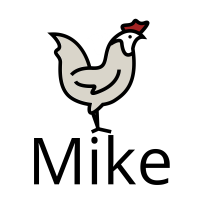I’ve been working with a Javascript (+ TypeScript) + Java + SQL stack for the last 10 years.
For 2024 I’d like to learn a new programming language, just for fun. I don’t have any particular goals in mind, I just want to learn something new. If I can use it later professionally that’d be cool, but if not that’s okay too.
Requirements:
- Runs on linux
- Not interested in languages created by Google or Apple
- No “joke languages”, please
Thank you very much!
EDIT: I ended up ordering the paperback version of the Rust book. Maybe one day I’ll contribute to the Lemmy code base or something :P Thank you all for the replies!!!
Personally, the language that’s taught me the most to learn has been Haskell. It has a lot of very interesting ideas and a learning curve that plateaus after most other languages. There are several ideas that have trickled down from Haskell to other parts of the programming world and learning about them in the context Haskell is in my opinion better because you’ll learn about them in a context where they fit in with the rest of the language very well instead of being late additions that offer an alternate way of doing things.
Coming from Java and JS, Haskell has a very different approach to a lot of things so you’ll have to re-learn a lot before you get productive in it. This can be frustrating for some but you’ll learn more if you get over that hump on the other hand.
Haskell doesn’t see very much industry use and arguably isn’t very well suited for industrial application (I haven’t used it professionally so I don’t know personally) so it might not directly help you land any new jobs but it is in my opinion it’s a very good way to develop as a programmer.
Id suggest rust, gets you a step closer to the hardware and a bit of a different paradigm than Java while still feeling high level.
Rust is definitely something I’ve been keeping an eye on. The syntax looks a bit scary, to be honest, but looks very versatile.
I’ll second Rust, it’s so fresh and versatile! You can go from super low level stuff all the way to things like web frameworks with WebAssembly and whatnot.
The memory model is definitely a unique beast but I’ve found it gave me some insight on how it all actually works behind the scenes and I appreciate the strictly enforced correctness too.
I’m a Rust noob. At first it’s daunting and nothing will compile. But it’s getting easier and I feel like getting over that initial difficulty is mainly a matter of internalizing a few basic rules, after which it feels more natural. So from what I’ve seen so far, I wouldn’t rate Rust as especially difficult. It certainly feels easier than C++.
For a really challenging language I’d suggest Haskell. That one nearly broke my brain because thinking functionally is really very different if you’re used to more procedural languages. Rust, it seems, teaches you new discipline, but Haskell teaches you a different way of thinking.
Anyway, that’s how it feels as a relative noob in both.
Definitely rust, and definitely use rustrover from jetbrains for an IDE. It’s amazing
Except that actually doing anything with hardware is “unsafe.”
Well, yeah, because doing things with hardware is just always unsafe in that sense, no matter if you’re implementing it in Rust or C or Assembly. As long as you know what you’re doing (and the hardware manufacturer did, too), it’s not actually unsafe.
Rust just decided to isolate the code parts where you need to be extra smart like that, whereas in C or Assembly, you might need to be extra smart throughout the entire code base.
Obviously, no sane C programmer would just randomly start scrubbing memory addresses in UI code, but it’s still just helpful to have the naughty code clearly indicated.Hardware is inherently unsafe.
I can recommend Rust - I’m training a few people on it.
And a pure functional programming language like Haskell or Scheme, if you don’t know what functional programming is, or are not comfortable with it. Functional programming needs a different mental approach to traditional (imperative) programming paradigm. Some of the more modern languages like Rust, JS and Python incorporate a lot of functional programming constructs. So it makes sense to learn them.
And a lisp - Common Lisp’s popularity is a public secret. Scheme is also fine. This family is homoiconic (program and data are treated more less the same). The syntax is actually very close to its AST. This gives Lisp unparalleled metaprogramming capabilities - mostly through macros. Macros in traditional languages are nowhere near Lisp Macros.
If it interests you, study a stack based language like Forth or Factor. Though they feel very different from Lisps, they have similar underlying properties. And you get more or less the same advantages.
+1 for Rust, the learning curve can be pretty daunting, but once you’re over the hump you’ll never want to go back
Agree. The official book is a really good start though, and available for free. https://doc.rust-lang.org/stable/book/
I actually ordered the paperback version of the book. I hope it’s not too outdated compared to the online version, I just enjoy reading in actual paper :P
The second edition was published last Feb (2023) I believe. I read it on my Kindle, having “flicked through” the online version about 6 months prior, and yeah having it page by page with bookmarks etc was almost as good as paper, but far superior to the web version and I was able to read it cover to cover and gain a lot from it. I immediately then read about 4 other books on Rust! Can recommend “Rust Atomics & Locks” by Mara Bos, and “Rust for Rustaceans” by Jon Gjengset for the next level up.
Yeah, I did indeed buy the second edition! Thanks for the suggestions! Cheers.
Python seems to be a staple for as long as I can remember and it looks like it’s still gonna be going strong for a good while yet!
I’m thinking of taking the dive and finally learning it myself soon.
Packaging solutions kinda sucks, but we’re about to get a JIT in the main CPython so that’s exciting.
When I used to work a lot with Python the packaging solutions available were the bane of my existence. I hope they’ve gotten better by now…
Python’s become very widely used in industry - it’s definitely a plus when looking for jobs these days. TIOBE now says it’s the most popular language in the world.
Python is especially great for quick scripts or PoCs. I’ve been using it a lot lately to prototype some things and it just makes it a breeze
Main complaint is the snake_casing convention. By far my least favorite
Hah I love snake case.
I also love python for distributed micro tasks and data pipelining
I am the only person that feels like snake casing belongs in declarative stuff, data serialization etc. (SQL, protobuf, JSON, YAML…) while camel case elsewhere?
I don’t hold any of that, I just find it the most readable for me.
If you decide to take the plunge, I highly recommend the programming course on mooc.fi.
Hadn’t heard of that, will check it out for sure. Thanks 🙌!
Anytime. Their discord community there is very active and helpful. If you’d like help or feedback without getting muddied by discord, feel free to inbox me.
Great for prototyping and quick scripts.
That and such rich set of libraries for anything you want.
I recently picked up Rust, still a beginner, but it’s very nice. And the compiler errors and tips are top. Since I used only Python before, Rust is my first compiled language and I’m glad it was Rust. Options and Result’s are also something I appreciate tbh. Other than for AI, simple stuff and maybe prototypes, I would use Rust over Python. Definitely recommend it. The borrow checker is a pain in the ass though. I’ll also be using it later for embedded systems when I become more fluent with it. I am also currently making a big project with Rust that I haven’t been able to do with Python.
Rust
Download GODOT and learn the scripting language and the shader language. Make a game! Or at least neat shader art.
Bonus answer: Csound. Make funky noises with code.
I have a couple of suggestions based on what you want!
Ocaml: A good intro into functional programming
The languages you’ve used seem to be primarily imperative style. Ocaml is not commonly used in the industry (with some exceptions), but it has a vibrant small community, and more importantly, because it’s a functional language, it will be different enough from what you know. Even if you don’t use it in industry, it will teach you a lot that would be hard to learn using non-functional languages.
Ocaml is a compiled language, with a very fast compiler and very good type system.
Scala: the only semi-mainstream language that blends OOP and proper functional programming well.
Although scala is mostly a functional language, it still has most of the gestures of imperative OOP languages like Java. It is also far more mainstream than ocaml and has used in industry.
Scala also runs in JVM like Java, and thus gives you access to most JVM libraries.
Rust
Intro into low level programming Other answers spoke enough about Rust so I won’t dive here
Zig
similar to Rust in low-levelness, but less mainstream, better C interop, and other interesting differences
Raku: the result of 15 years of programming language design
Raku, formerly perl 6, was almost redesigned from the ground up to resolve complaints of perl 5. It has a very interesting design, with a gradual type system, a blend of functional and OOP paradigms, plus interesting syntax features like sigils and grammars.
There are many interesting languages out there. I could talk forever about this, but I’ll leave you with the above. I personally would recommend ocaml if you’re interested in functional programming or care about performance. Otherwise, Raku, since its very interesting but doesn’t perform well (Raku’s VM is still immature and under development).
Ocaml is going to be my next learn for fun language forsure! I’m getting sucked into the functional paradigm hole. The option/result types in rust have made working in languages without them much worse.
Coming from JavaScript, they may enjoy using ReScript instead of Ocaml.
I tried to give OP languages that would be reasonably different from what they know already, so that its more fun (imo).
However I didn’t know of ReScript, so I gotta check it out.
I’m sorry, but as someone who was paid for Perl 5, I have trouble seeing the appeal for Raku.
The first thing they should have done was nuke Perl from the orbit. Instead they built on top of the magic variable hell.
So no thanks. PHP is much better.
C# is a great choice.
Incredibly versatile language and should be an easy jump from java.
In my previous company we had a dot net + Microsoft SQL server stack. The code base was admittedly really really bad but those .NET Web Forms were horrendous to work with. C# in general felt very close to Java at the time, except for the LINQ queries I guess.
I’m sure that, like PHP, the technology has come a long way and things are better and more modern right now. This was before Nugget was even a thing! Regardless, I feel like those chapters in my life are finished. I’d rather try something actually new to me!
My two cents: I strongly agree with this. We just deployed an intranet blazor server app running on Linux (don’t know which distro) and apache (we might switch to nginx soon). It works very well and we had to write less than 100 lines of JS (mostly for file download and upload) One of my workmates was hired one year ago and at the time he didn’t know anything about .Net stack. Now he is mostly autonomous and he loves .Net and blazor in particular. Obviously YMMV.
Bundle size is my only complaint with blazor, has to send the .net runtime in webassembly to the client.
Aside from this, C# on the browser is an absolute joy to use. I’d use for everything if I could.
You are talking about Blazor webassembly, I am talking about Blazor server side, which loads as fast as a “normal” website.
Server side Blazor has other caveats, that’s why I specified it is an intranet project, where server side Blazor fits very well. Anyway, at the moment, Microsoft is still putting effort in polishing both type of Blazor hosting model.
This is not our first Blazor intranet web app and some of them are running in production for one year more or less.
It is really a joy to program using Blazor, especially if you need cross tab/browsers/device/user real time communication, which comes almost free thanks to underlying SignalR channel.
Ah you mean Razor then. Blazor lets you run C# in the browser, but Razor is the one that needs a server and streams changes to the client using signalR.
I know Microsoft didn’t get this right with naming and you got caught in the trap but there are 2 (actually 3) ways of hosting Blazor.
I also see that this confusion won’t help OP choose Blazor over some more coherent dev environment hehehehe
Sorry, that’s my bad, I was under the impression that Blazor and Razor were two distinct ways of doing things. Thanks for that link, it was very helpful.
Razor
Razor is the templating engine that’s been there since the original MVC. Blazor Server is the one that needs a server and streams changes to the client using signalR. Blazor WASM is the one that uses Web Assembly. As of .Net 8, Blazor can now also ne used as a generic SSR backend. They all use Razor Components, which is a component model using the Razor engine.
Not to be confused with Razor Pages, which is also a generic SSR backend.
Agreed, as a Java developer you will hopefully find C# familiar but more refined. They share a lot of the same features now, but C# seems to do them all better, in my opinion. Linq especially is just so much more enjoyable for me than Java Streams.
.NET Core (now just .NET) readily runs on Linux and Visual Studio has a free edition that is superb - an IDE provided by the language developers. Of course, you can always use Visual Studio Code or a third-party offering like Rider (by JetBrains so the transition from Java could be very easy of you are already familiar with their programs).
My only complaint on C# is that the .NET versioning is a little confusing if you aren’t already familiar. However, that’s only an issue if you work with legacy code. New versions after .NET 5 are all the same naming and upgrading is generally effortless, just changing a single number in your project file and downloading the proper SDK
I get the impression OP wants to try something new. Java and C# are pretty similar.
Just don’t bring your damn factories over. For some reason Java developers just love unnecessary layers of abstraction and forcing that ridiculous factory pattern.
And they bring it to any language they develop in after Java.
If you see someone saying “no Java developers” for a position, this is why. They’ve been trained incorrectly, as a joke.
All the core parts of dotnet (e.g.
roslyn) seem to be built that way. I find them very frustrating to work on. Between that and the whole nuget thing being somewhat FOSS unfriendly, I’d steer people away from C#.I don’t get how NuGet is FOSS unfriendly. I mean, at worst you could set up your own repository. All the tools are local. It wouldn’t be difficult to set up your own source if that was absolutely necessary.
The whole thing is built around pulling binary packages from servers, and there’s no consistent way of building those things from source.
It’s extremely difficult to package anything non-trivial without referencing those binary blobs.
They had to build this whole custom thing (https://github.com/dotnet/dotnet) just to make the SDK itself buildable from source, and most releases still have some binary dependencies. They only did it for the SDK so it could be packaged in Debian, etc.
I would suggest Nim, I had a blast learning it and making a small project. It is not a mainstream language, nor is it a joke language.
No jokes: pick a language that is in the market, but has a different design philosophy than your background. Your background includes compiled static, and loose scripting, with strong library tooling, so you have diversity there, so a language in which you have to think differently is the right choice.
I recommend:
- Rust if you want something safe but that makes you work differently from java
- Go if you want a real mental challenge (the coding approach is very different from java)
- Lua if you want really see functional programming as a philosophy
- Python if you want scripting, and are tired of the web
Go if you want a real mental challenge
I don’t mean to be rude, but I find this baffling; what do you mean by it? One of the primary design goals of Go is to be simple to learn (this is fairly well documented), and it’s one of the few things I really have to give the language credit for. Rob Pike has specifically discussed wanting it to be accessible to recent CS graduates who have mostly used Java. I have never heard anyone before describe learning Go as a “challenge.”
- Lua if you want really see functional programming as a philosophy
I’m pretty sure that Lua doesn’t follow functional programming as a philosophy…
I’ll suggest Elixir. It’s a language that runs on the same virtual machine as Erlang, which has proven to be great for ultra-reliable and excellent at managing many, MANY concurrent processes.
Elixir itself builds upon this great foundation with a syntax similar to Ruby, but entirely functional. It’s a delightful language to read and write.
Rust, haskell, python, c++ are all interesting choices. I would argue that c# is too close to what you already know to be interesting.
If I were you though, I’d pick a project first, then decide what language makes sense for it.
This is my favourite list in here, but I’d throw a Lisp in too.
Lisp, Haskell, and Rust should all teach you something new and profound about programming.
If I were you though, I’d pick a project first, then decide what language makes sense for it.
Certainly the best approach is to use the best language for your project. Right now my project is to learn something new and exciting, I bet when I start learning the ropes I’ll get some ideas!
While it’s related to your job and not very new compared to your current stack, it’s very worth it to learn typescript. It has a cool type system and makes frontend development sane.
Just avoid their implementation of Enums.
Even their official documentation says to avoid it 🙂
DotNet is closest to Java, but hang on to your hat: the state of C# is at least half a decade ahead of Java, if not a full decade. It’s sophistication will make Java use feel like banging rocks together. DotNet Core can now run on all three primary platforms, and with some careful work, you can write a single program that can compile down to each platform and carry along its own required binaries, no pre-install of any framework needed.
My second recommendation would be Rust. Stupidly steep learning curve, but an absolutely game-changing one where safety and security is concerned. It’s my next objective, personally speaking.
Any other language I could recommend starts getting into speciality purposes, which makes general use more difficult or even wholly inappropriate.
For example, if you are dropping into DotNet for business applications, I would also recommend diving into F# for that functional goodness for building complex business rules and data handling. But building an entire app in F# can be jamming a round peg into a square hole under many circumstances, it’s appropriateness envelope does not cover as many cases as C# does. You want to use C# for boilerplate/frameworks, F# for the core bits where it is going to shine.












